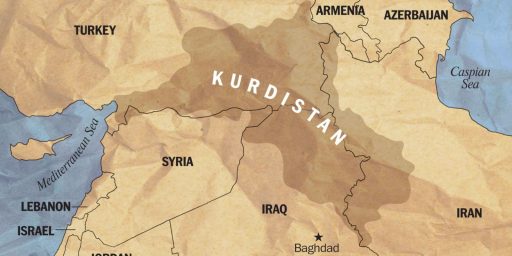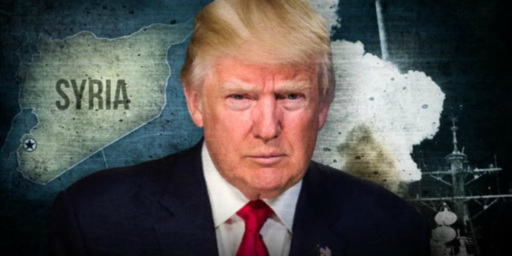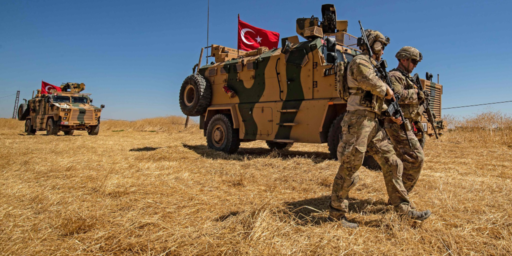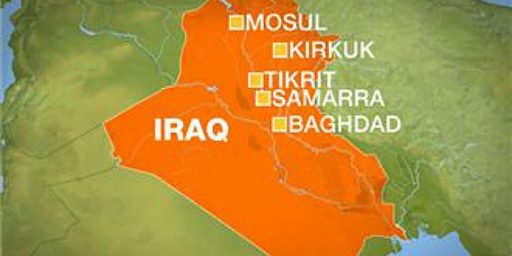Turkey Set to Invade Iraq? (Updated)
The Turkish parliament yesterday voted 507 to 19 to give Prime Minister Recep Tayyip Erdogan permission to order strategic strikes or large-scale invasions of Iraq to deal with invasions by the Kurdistan Workers’ Party (PKK). While Erdogan has indicated that he plans no immediate action, Tom Grant thinks the authorization quite serious.
Turkish politicians no longer believe that the Iraqi government is capable of dealing with the PKK. In fact, it’s hard to believe that the Iraqi military would make the PKK a high-priority target, given how occupied the Iraqi Security Forces (ISF) are with other problems. While Turkish troops crossing the border into Iraq might be embarrassing, Iraqi leaders know that it’s hardly a nightmare scenario.
The political and diplomatic backlash from Turkish cross-border operations all depend on what form these attacks take. Options range from the plausible, such as occasional raids against suspected PKK concentrations, to the unbelievable, such as a de facto occupation of northern Iraq. While some Turks might like to see the PKK crushed once and for all, the general staff of the Turkish Armed Forces knows that the real objective is to drive the PKK away from the border, making it increasingly harder for PKK fighters to operate inside Turkish terrority. Turkish forces might easily accomplish this objective without a massive military intervention in Iraq.
This strategy might run aground if the PKK continues to elude the Turkish military. The strategy might really jump off the rails if Iraqi civilians are killed during these operations.
Fortunately, there are other interested parties that can lower the risk of these sorts of mishaps: other Iraqi Kurds. The PKK is hardly popular among other Kurds, who don’t want their political fortunes to be hostage to the Kurdish version of the PFLP. Frictions between the PKK and rival groups, such as the Patriotic Union of Kurdistan (PUK) and the Kurdistan Democratic Party (KDP), existed long before the 2003 invasion of Iraq. (For a recent example of how intansigent the PKK can be, click here.) While Kurdish leaders such as Iraqi president Jalal Talabani can’t overtly cooperate with the Turks, they can moderate the political backlash from any Turkish incursions. While no one is likely to say it to a reporter, other Kurds might also provide information about the PKK to Iraqi, American, and even Turkish authorities.
To say the least, the interests of neither Iraq, the United States, nor Turkey are served by adding another variable to the ongoing mess in Iraq. One can hardly blame the Turks, though, from thinking they need to react to incursions by the PKK. If the Iraqi and American forces in Iraqi Kurdistan can’t or won’t stop them, the Turks may have little choice but to take military action.
Update (Dave Schuler)
I posted about this over at my place yesterday. Not only are the Turks preparing to invade but the Iraqi national government is taking something of a “hands-off” attitude towards the whole matter:
BAGHDAD, Iraq (CNN) — The Iraqi army has no plan to deploy its soldiers near the rugged Turkish-Iraqi border to take on the Kurdish rebels targeting Turkey, and Iraqi authorities are satisfied with the efforts by the Iraqi Kurdish regional authorities to deal with the militants there, a top Iraqi military official told CNN
“It’s a mountainous area, difficult terrain and our troops are not trained for that,” said Lt. Gen. Nasier Abadi, Iraqi Armed Forces deputy chief of staff.





Lessee – when violent felons cross our southern border, we jail border patrol agents who dare to unholster a gun in response. Can’t condi rice explain to the Turks that this is how they should handle the PKK?
I’m intrigued by the Iraqi government response. The Kurds have long been a bright spot in Iraq with regards to relative peaceful conditions. But as AQ gets damaged by Sunnis turning on AQ, as shite militias get reined in as the threat of Sunni violence subsides undercutting their justification with the shites, could the Iraq government be looking forward to the time that the PKK becomes the largest non-Iraqi government force in the country. And as such, are they thinking to let the Turks take some starch out of the PKK?
While the Kurds in the Iraqi government may get upset about this, the logical Iraqi government position is to seek a demilitarized zone on both sides of the border (which Turkey could probably live with).
I doubt either Turkey or the Kurds could live with it. It is a pretty long border that would require thousands of troops on both sides to enforce it. There is also the same possible problem concerning the border with Iran, if the Iranian Kurds become more active. As far as the Iraqi government is concerned, the Kurds are on their own. They just came right out & said they will not get involved. While the excuse used is true, they have no interest to do so anyway. And no one else cares enough to send in a UN peacekeeping force, or a US one either.